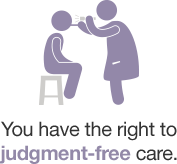LGBTQ Health
DownloadPrimary Care
Many of the steps to good health are the same for everyone, but for LGBTQ people, there are barriers that can make accessing health care services more difficult.


- In New York City, you have the right to care that respects who you are, no matter who you have sex with or how you define your gender.
- Talk honestly with your provider about your health concerns, sex life, tobacco and drug use.
- Tell your provider the name and pronouns you use, the medicines you take and any surgeries you may have had.
Sexual Health
You can enjoy your sex life and stay healthy. Talk to your provider or visit a Health Department Sexual Health Clinic for little or no cost to:
- Design a sexual and reproductive health care plan that works for you
- Get vaccinated for HPV, hepatitis A and B, and meningococcus, if recommended by your provider
- Get tested for sexually transmitted infections, including HIV
Know Your HIV Status
If you are HIV-negative and are worried about HIV, ask your provider about PrEP. If you think you have been exposed to HIV, go immediately to an emergency room or Sexual Health Clinic and ask for PEP. You can also call the NYC PEP Hotline, 24/7, at 844-3-PEPNYC.
Mental Health
LGBTQ people are more likely to experience depression and anxiety because of anti-LGBTQ stigma.
Some trans people experience additional stress when they are treated in a way that is inconsistent with their gender identity.
People cope with stress and depression in different ways, including misusing drugs and alcohol.
If you’re having trouble coping, speak to your provider or someone you trust about resources to help you manage your health.
For help finding services or to speak with someone, call NYC Well at
1-888-NYC-WELL or text WELL to 65173.
Supporting LGBTQ Youth
LGBTQ high school students are more likely to experience physical and sexual violence and bullying than their heterosexual peers.1
To support a loved one:

1“Health Risks Among Sexual Minority Youth,” Centers for Disease Control and Prevention.
https://www.cdc.gov/healthyyouth/disparities/smy.htm





